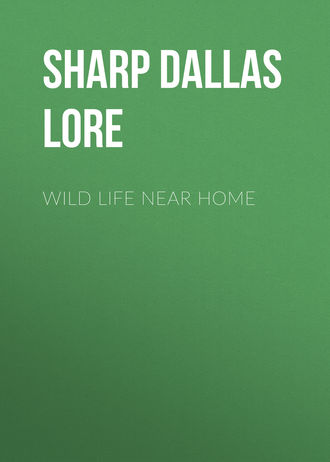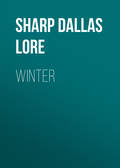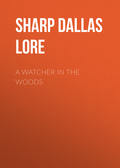
Sharp Dallas Lore
Wild Life Near Home
A BIRD OF THE DARK
The world is never more than half asleep. Night dawns and there is almost as wide a waking as with the dawn of day. We live in the glare till it leaves us blind to the forms that move through the dark; we listen to the roar of the day till we can no longer hear the stir that begins with the night. But here in the darkness is life and movement, – wing-beats, footfalls, cries, and calls, – all the wakefulness, struggle, and tragedy of the day.
Whatever the dusk touches it quickens. Things of bare existence by day have life at night. The very rocks that are dead and inanimate in the light get breath and being in the dark. What was mere substance now becomes shadow, and shadow spirit, till all the day's dead live and move. The roads, fences, trees, and buildings become new creatures; landmarks, distances, and places change; new odors are on the winds; strange lights appear; soft footsteps pass and repass us; and hidden voices whisper everywhere. The brightest day is not more awake; at high noon we are not more alert.
One of the commonest of these night sounds is the cry of the whippoorwill. From the middle of April to the end of September it rings along the edge of the clearing; but how seldom we have seen the singer! To most of us it is only a disembodied voice. Night has put her spell upon the whippoorwills and changed them from birds into wandering shadows and voices. There is something haunting in their call, a suggestion of fear, as though the birds were in flight, pursued by a shape in the gloom. It is the voice of the lost – the voice of the night trying to find its way back to the day. There is snap enough in the call if you happen to be near the bird. Usually the sound comes to us out of the darkness and distance – the loneliest, ghostliest cry of all the night.
It is little wonder that so many legends and omens follow the whippoorwill. How could our imaginations, with a bent for superstition, fail to work upon a creature so often heard, so rarely seen, of habits so dark and uncanny?
One cannot grow accustomed to the night. The eager, jostling, open-faced day has always been familiar; but with the night, though she comes as often as the day, no number of returns can make us acquainted. Whatever is peculiarly her own shares her mystery. Who can get used to the bats flitting and squeaking about him in the dusk? Or who can keep his flesh from creeping when an owl bobs over him in the silence against a full moon? Or who, in the depths of a pine barren, can listen to a circle of whippoorwills around him, and not stay his steps as one lost in the land of homeless, wailing spirits? The continual shifting of the voices, the mocking echoes, and the hiding darkness combine in an effect altogether gruesome and unearthly.
One may hear the whippoorwill every summer of his life, but never see the bird. It is shy and wary, and, with the help of the darkness, manages to keep strangely out of sight. Though it is not unusual to stumble upon one asleep by day, it is a rare experience to surprise one feeding or singing at night.
One evening I was standing by a pump in an open yard, listening to the whippoorwills as they came out to the edge of the woods and called along the fields. The swamp ran up so close on this side of the house that faint puffs of magnolia and wild grape could be strained pure from the mingling odors in the sweet night air. The whippoorwills were so near that the introductory chuck and many of the finer, flute-like trills of their song, which are never heard at a distance, were clear and distinct. Presently one call sounded out above the others, and instantly rang again, just behind a row of currant-bushes not ten feet away.
I strained my eyes for a glimpse of the creature, when swift wings fanned my face, and a dark, fluffy thing, as soft and noiseless as a shadow, dropped at my feet, and exploded with a triple cry of Whip-poor-will! that startled me. It was a rapid, crackling, vigorous call that split through the night as a streak of lightning through a thunder-cloud. The farmers about here interpret the notes to say, Crack-the-whip! and certainly, near by, this fits better than Whip-poor-will!
The bird was flitting about the small platform upon which I stood. I remained as stiff as the pump, for which, evidently, it had mistaken me. It was not still a moment, but tossed back and forth on wings that were absolutely silent, and caught at the insects in the air and uttered its piercing cry. It leaped rather than flew, sometimes calling on the wing, and always upon touching the ground.
This is as good a view of the bird as I ever got at night. The darkness was too thick to see what the food was it caught, or how it caught it. I could not make out a pose or a motion more than the general movements about the pump. The one other time that I have had a good look at the bird, when not asleep, showed him at play.
It was an early August morning, between two and three o'clock. The only doctor in the village had been out all night at a little town about five miles away. He was wanted at once, and I volunteered to get him.
Five miles is pure fun to a boy who has run barefoot every one of his fifteen summers; so I rolled up my trousers, tightened my belt, and bent away for Shiloh at an easy dog-trot that, even yet, I believe I could keep up for half a day.
There was not a glimmer in the east when I started. I had covered three miles, and was entering a long stretch of sprout-land when the dawn began. The road was dusty, and the dew-laid powder puffed beneath the soft, swift pats of my feet. Things began to stand out with some distinctness now as the pale light brightened. No wagons had been along, and every mark of the night was plain. Here and there were broad, ragged-edged bands across the road – the trails of the wandering box-turtles. I saw the smooth, waving channel left by a snake that had just gone across. Here and there were bunches of rabbit tracks, and every little while appeared large spots in the road, where some bird had been dusting itself.
Suddenly I made a sharp turn, and almost ran over a whippoorwill concealed in a very cloud of dust which she was flirting up with her wings. This explained the spots back along the road. The bird flew up and settled a few yards ahead of me, and took another hasty dip. This she kept up for nearly a quarter of a mile.
The road was alive with whippoorwills. It was their bathing-hour, and playtime, too. The serious business of the night was done; they had hunted through the first hours, and now it was time to be social. The light was coming rapidly, and so was bedtime; but they called and capered about me, playing away the narrowing night to the very edge of day.
On my return, an hour later, the sun was looking over the tops of the "cut-offs," but he did not see a whippoorwill. They were all roosting lengthwise upon the logs and stumps back among the bushes.
These unnatural, unbirdlike habits of the whippoorwill are matched by the appearance of the bird. The first time one sees a whippoorwill he questions whether its shape and color are the result of its nocturnal life or whether it took to the night to hide its unbeautiful self from the gaze of the day.
It has ridiculously short legs, a mere point of a bill, and a bristled, head-dividing gap that would shame a frog. Looked at in the daylight, its color, too, is a meaningless mixture, as unreal and half done as the rest of the creature. But we should not be so hasty in our judgment. There is design in all things in nature; utility is the first law of creation: and the discovery of plan and purpose is the highest appreciation of beauty.
The whippoorwill's dress must be criticized from the view-point of its usefulness to the bird; then it becomes one of the most exquisitely artistic garments worn. Compare it with that of any other bird, and your wonder at it grows. Another such blending of light and shadow cannot be found. The night herself seems to have woven this robe out of warp from the strands of early dawn and of woof spun from the twilight.
The whippoorwill cannot change the color of its dress with the passing clouds, nor match it with the light green of unfolding leaves and the deep bronze of old tree-trunks, as the chameleon can. But the bird has no need of such control. It is always in harmony with its surroundings. In the falling twilight it seems a shadow among the shadows; in the breaking dawn it melts into the gray half-light, a phantom; at midnight it is only an echo in the dark; and at noontime you would pass the creature for a mossy knot, as it squats close to a limb or rail, sitting lengthwise, unlike any bird of the light.
We need not expect a bird of such irregular habits as the whippoorwill to have the normal instincts of birds, even with regard to its offspring. A bird given to roaming about at night, the companion of toads and bats and spooks, is not one that can be trusted to bring up young. You cannot count much on the domesticity of a bird that flits around with the shadows and fills the night with doleful, spellbinding cries.
The nest of the whippoorwill is the bare ground, together with whatever leaves, pebbles, or bits of wood happen to be under the eggs when they are laid. I found a nest once by the side of a log in the woods, and by rarest good fortune missed putting my foot upon the eggs. Here there was no attempt at nest-building, not even a depression in the earth. There were two of the eggs, – the usual number, – long and creamy white, with mingled markings of lavender and reddish brown. Here, upon the log, one of the birds dozed away the day, while the mate on the nest brooded and slept till the gloaming.
The effect of this erratic life in the forest glooms and under the cover of night has been to make the whippoorwill careless of her home and negligent of her young. She has become a creature of omen, weird and wakeful, lingering behind the time of superstition to keep myths moving in our scanty groves and mystery still stirring through the dark rooms of the night.
THE PINE-TREE SWIFT
In any large museum you may see the fossil skeletons, or the casts of the skeletons, of those mammoth saurians of the Mesozoic Age. But you can go into the pine barrens any bright summer day and capture for yourself a real live saurian. The gloom of the pines is the lingering twilight of that far-off time, and the pine-tree lizard, or swift, is the lineal descendant of those reptile monsters who ruled the seas and the dry land before man was.
Throughout southern New Jersey the pine-tree swifts abound. The worm-fences, rail-piles, bridges, stone-heaps, and, above all, the pine-trees are alive with them. They are the true children of the pines, looking so like a very part of the trees that it seems they must have been made by snipping off the pitch-pines' scaly twigs and giving legs to them. They are the aborigines, the primitive people of the barrens; and it is to the lean, sandy barrens you must go if you would see the swifts at home.
In these wide, silent wastes, where there are miles of scrub-pine without a clearing, where the blue, hazy air is laden with the odor of resin, where the soft glooms are mingled with softer, shyer lights, the swifts seem what they actually are – creatures of another, earlier world. When one darts over your foot and scurries up a tree to watch you, it is easy to imagine other antediluvian shapes moving in the deeper shadows beyond. How they rustle the leaves and scratch the rough pine bark! They hurry from under your feet and peek around the tree-trunks into your face, their nails and scales scraping, while they themselves remain almost invisible on the deep browns of the pines; and if you are inclined to be at all nervous, you will start and shiver.
The uncanny name "lizard" is partly accountable for our unpleasant feelings toward this really intelligent and interesting little beast. If he were more widely known as "swift," Sceloporus would be less detested. The z in "lizard" adds a creepy, crawly, sinister something to the name which even the wretched word "snake" does not suggest. "Swift," the common name in some localities, is certainly more pleasing, and, at the same time, quite accurately descriptive.
There is nothing deadly nor vicious, nor yet unlovely, about the swift, unless some may hate his reptile form and his scales. But he is strangely dreaded. The mere mention of him is enough to stampede a Sunday-school picnic. I know good people who kill every swift they meet, under the queer religious delusion that they are lopping off a limb of Satan. "All reptiles are cursed," one such zealot declared to me, "and man is to bruise their heads." The good book of nature was not much read, evidently, by this student of the other Good Book.
The swift is absolutely harmless. He is without fang, sting, or evil charm. He is not exactly orthodox, for he has a third eye in the top of his head, the scientists tell us; but that eye is entirely hidden. It cannot bind nor leer, like Medusa. Otherwise the swift is a perfectly normal little creature, about six inches long from tip to tip, quick of foot, scaly, friendly, wonderfully colored in undulating browns and blues, and looking, on the whole, like a pretty little Noah's-ark alligator.
On the south side of the clump of pines beyond Cubby Hollow is a pile of decaying rails where I have watched the swifts, and they me, for so many seasons that I fancy they know me. Dewberry-vines and Virginia creeper clamber over the pile, and at one end, flaming all through July, burns a splendid bush of butterfly-weed. The orange-red blossoms shine like a beacon against the dark of the pines, and lure a constant stream of insect visitors, who make living for the swifts of this particular place rich and easy while the attraction lasts.
Any hot day I can find several swifts here, and they are so tame that I can tickle them all off to sleep without the slightest trouble. They will look up quickly as I approach, fearless but alert, with head tilted and eyes snapping; but not one stirs. With a long spear of Indian grass I reach out gently and stroke the nearest one. Shut go his eyes; down drops his head; he sleeps – at least, he pretends to. This is my peace greeting. Now I may sit down, and life upon the rail-pile will go normally on.
Upon the end of a rail, so close to a cluster of the butterfly-weed blossoms that he can pick the honey-gatherers from it, – as you would pick olives from a dish on the table, – lies a big male swift without a tail. He lost that member in an encounter with me several weeks ago. A new one has started, but it is a mere bud yet. I know his sex by the brilliant blue stripe down each side, which is a favor not granted the females. The sun is high and hot. "Fearfully, hot," I say under my wide straw hat. "Delightfully warm," says the lizard, sprawling over the rail, his legs hanging, eyes half shut, every possible scale exposed to the blistering rays, and his bud of a tail twitching with the small spasms of exquisite comfort that shoot to the very ends of his being.
The little Caliban! How he loves the sun! It cannot shine too hot nor too long upon him. He stiffens and has aches when it is cold, so he is a late riser, and appears not at all on dark, drizzly days.
His nose is resting upon the rail like a drowsy scholar's upon the desk; but he is not asleep: he sees every wasp and yellow-jacket that lights upon the luring flowers. He has learned some things about the wasp tribe; and if any of them want honey from his butterfly-weed, they may have it. These come and go with the butterflies and hard-backed bugs, no notice being taken. But I hear the booming of a bluebottle-fly. Sceloporus hears him, too, and gathers his legs under him, alert. The fly has settled upon one of the flower-clusters. He fumbles among the blossoms, and pretty soon blunders upon those watched by the swift. Fatal blunder! There is a quick scratching on the rail, a flash of brown across the orange flowers, and the next thing I see is the swift, back in his place, throwing his head about in the air, licking down the stupid bluebottle-fly.
A spider crawls over the rail behind him. He turns and snaps it up. A fly buzzes about his head, but he will not jump with all four feet, and so loses it. A humming-bird is fanning the butterfly-weed, and he looks on with interest not unmixed with fear. Now the bugs, butterflies, hornets, and wasps make up the motley crowd of visitants to his garden, and Sceloporus stretches out in the warmth again. He is hardly asleep when a bird's shadow passes across the rails. The sharp scratch of scales and claws is heard at half a dozen places on the pile at once, and every swift has ducked around his rail out of sight.
An enemy! The shadow sweeps on across the melon-field, and above in the sky I see a turkey-buzzard wheeling. This is no enemy. Evidently the swifts mistook the buzzard's shadow for that of the sharp-shinned hawk. Had it been the hawk, my little bobtailed friend might have been taking a dizzy ride through the air to some dead tree-top at that moment, instead of peeking over his rail to see if the coast were clear.
All the lesser hawks feed upon the swifts. I have often seen the sparrow-hawk perched upon a tall stake searching the fences for them. Cats eat them also. But they do not agree with puss. They make a cat thin and morbid and unhappy. We can tell when the lizard-catching disease is upon Tom by his loss of appetite, his lankness, and his melancholy expression.
All fear of the hawk is passed, and the lizards come out into the light again. Presently one leaves the rails, runs over my foot, and dashes by short stages into the field. He is after a nest of ants, or is chasing a long-legged spider. It is worth while to follow them when they take to the fields, for they may let you into a secret, as they once did me.
About a hundred feet into the melon-patch stands an old and very terrible scarecrow. It is quite without terrors for the swifts, however. Around this monster's feet the soil is bare and open to the sun. One day I discovered a lizard making her way thither, and I followed. She did not stop for ants or spiders, but whisked under the vines and hastened on as if bound on some urgent business. And so she was.
When she reached the warm, open sand at the scarecrow's feet, she dug out a little hollow, and, to my utter amazement, deposited therein seven tough, yellowish, pea-like eggs, covered them with sand, and raced back to the rail-pile. That was all. Her maternal duties were done, her cares over. She had been a faithful mother to the last degree, – even to the covering up of her eggs, – and now she left them to the kindly skies. About the middle of July they hatched, and, in finding their way to the rail-pile, they stopped at the first mound on the road, and began life in earnest upon a fiery dinner of red ants.
It looks as if nature were partial in the care she takes of her children. How long she bothers and fusses over us, for instance, and how, without one touch of parental care or interest, she tosses the lizard out, even before he is hatched, to shift for himself. If, however, we could eat red ants the day we are born and thrive on them, I suppose that our mothers, too, without much concern, might let us run.
The day-old babies join their elders upon the rails, and are received with great good humor – with pleasure, indeed; for the old ones seem to enjoy the play of the youngsters, and allow them to climb over their backs and claw and scratch them without remonstrance. The swifts are gentle, peaceable, and sweet-tempered. They rarely fight among themselves. The only time that I ever found one out of humor was when she was anxiously hunting for a place in which to leave her eggs. The trouble of it all made her cross, and as I picked her up she tried to bite me. And I ought to have been bitten.
Ordinarily, however, the swifts are remarkably docile and friendly. If treated kindly, they will allow you to stroke them and handle them freely within a few minutes after capture. I have sometimes had them cling to my coat of their own will as I tramped about the woods. They hiss and open their mouths when first taken; but their teeth could not prick one's skin if they did strike.
They are clean, pretty, interesting pets to have about the house and yard. They are easily tamed, and, in spite of their agility, they are no trouble at all to capture. I have often caught them with my unaided hand; but an almost sure way is to take a long culm of green grass, strip off the plume, and make a snood of the wire-like end.
A swift is sunning himself upon a rail. He rises upon his front legs, as you approach, to watch you. Carefully now! Don't try to get too near. You can just reach him. Now your snood is slipping over his nose; it tickles him; he enjoys it, and shuts his eyes. The grass loop is about his neck; he discovers it, and – pull! for he leaps. If the snood does not break you have him dangling in the air. Bring him to your coat now, and touch him lightly till his fear is dispelled, then loose him, and he will stay with you for hours.
When upon a tree you may seize him with your bare hand by coming up from behind. But never try to catch him by the tail; for lizards' tails were not made for that purpose, though, from their length and convenience to grasp, and from the careless way their owners have of leaving them sticking out, it seems as if nature intended them merely for handles.
In my haste to catch the bobtailed lizard of the rail-pile, I carelessly clapped my hand upon his long, scaly tail, when, by a quick turn, he mysteriously unjointed himself from it, leaving the appendage with me, while he scampered off along the rails. He is now growing another tail for some future emergency.
Between eating, sleeping, and dodging shadows, the lizards spend their day, and about the middle of the afternoon disappear. Where do they spend their night? They go somewhere from the dew and cold; but where?
There is a space about two inches deep between the window-sash and the net-frames in my room. Some time ago I put a number of swifts upon the netting, covered the window-sill with sand, and thus improvised an ideal lizard-cage. All I had to do to feed them was to raise the window, drive the flies from the room on to the netting, and close the sash. The lizards then caught them at their leisure.
Two days after they were transferred here, and had begun to feel at home and fearless of me, I noticed, as night came on, that they descended from the netting and disappeared in the sand. I put my finger in and took one out, and found that the sand was much warmer than the dewy night air.
This was their bed, and this explained the sleeping habits of the free, wild ones. The sand remains warm long after the sun sets and makes them a comfortable bed. Into the sand they go also to escape the winter. They must get down a foot or more to be rid of the frost; and being poor diggers, they hunt up the hole of some other creature, or work their way among the decayed roots of some old stump until below the danger-line. By the middle of September they have made their beds, and when they wake up, the melons will be started and the May sunshine warm upon the rails.







